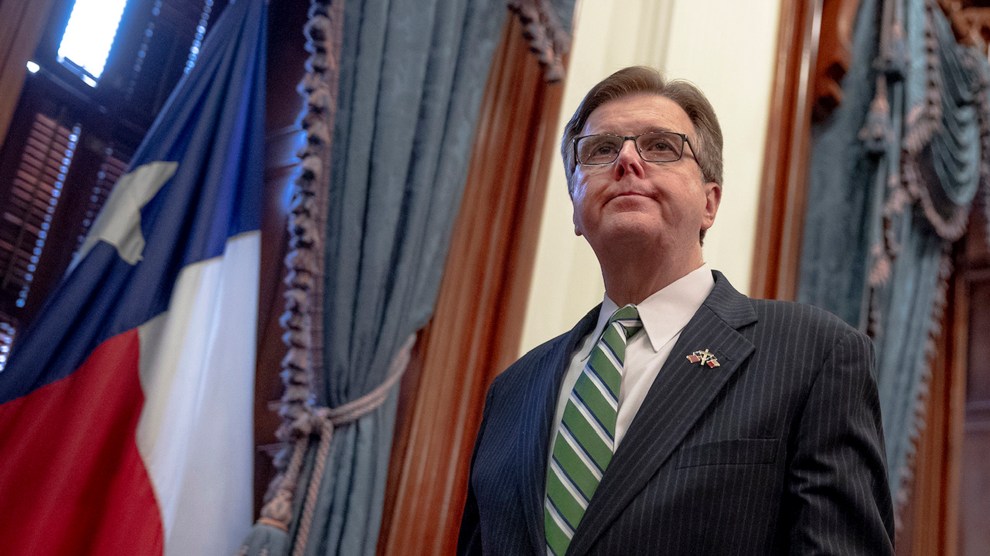
Nick Wagner/AAS/POOL/ZUMA Wire
On Thursday evening, two Texas writers, Chris Tomlinson and Bryan Burrough, were supposed to give a talk at the Bullock Texas State History Museum in Austin about Forget the Alamo, a new book they co-authored with Jason Stanford. The book, which sets out to dispel the myths of the Republic of Texas’ founding, has already made waves—it makes a persuasive case, for instance, that the state’s much-hyped acquisition of Alamo-related artifacts from the musician Phil Collins was actually just a bill of goods.
Hosting an event with the authors of a buzzy new book about the state’s famous but fraught symbol is what you’d expect a museum such as the Bullock to do. But a few hours before the talk was to begin, Tomlinson announced that the event had been cancelled—in the fullest sense of the word.
BANNED at the BULLOCK MUSEUM! Tonight @bryanborrough and I were supposed to talk about the craft of writing with Becka Oliver from @WritersLeague. Just hours before the even, @BullockMuseum canceled without contacting Bryan or I with an explanation. #ForgettheAlamo A thread …
— ChrisTomlinson (@cltomlinson) July 1, 2021
As Tomlinson explained it, the museum had been instructed by its board—which includes Texas’ Republican governor, lieutenant governor, and speaker of the house—to pull the plug. “I think we’re being censored,” he told the San Antonio Express-News. On Friday, Lt. Gov. Dan Patrick, confirmed in a tweet that yes, that was exactly what happened.
As a member of the Preservation Board, I told staff to cancel this event as soon as I found out about it. Like efforts to move the Cenotaph, which I also stopped, this fact-free rewriting of TX history has no place @BullockMuseum. #txlege https://t.co/ua1aSFxHCk
— Dan Patrick (@DanPatrick) July 2, 2021
This kind of censorship would be infuriating anywhere, but it’s particularly grating to see it happen the way it did, at a place like the Bullock, which in recent years has hosted significant work challenging the state’s core myths. When the museum first opened, as University of Texas historian Monica Muñoz Martinez recounted in her book, The Injustice Never Leaves You: Anti-Mexican Violence in Texas, it was criticized by historians for the way it repackaged the sanitized pseudo-history of Anglo Texas.
But by 2016, the institution had improved enough that it played host to a fairly remarkable exhibit—“Life and Death on the Border, 1910–1920.” The installation, which Martinez helped plan as part of a group of historians and activists called “Refusing to Forget,” told the story of state violence inflicted on people of Mexican descent in Texas in the early 20th century—a contrast to the hagiography with which state organs have talked about the Texas Rangers in the past.
One of the items displayed at the exhibit was an original copy of the 1919 investigation into the Rangers’ abuses by the Texas Legislature’s only Mexian-American lawmaker—the transcripts of which had gone unpublished for nearly a century. A few years later, the Bullock hosted a conference on the hearings themselves, at which high school students performed scenes from the proceedings. The Bullock has shown, in other words, the power of public history in elevating stories and facts that in some cases were deliberately suppressed by the state.
But Texas conservatives—like conservatives across the country—are in the midst of a moral panic about the teaching of “critical race theory.” Patrick has praised efforts to ban CRT (whatever it actually means) from public schools. And in this world, a book that challenges long-held myths about the state’s origins—and points out how the state government itself got bamboozled—simply cannot be allowed.
This is the reality of the recent CRT “debate.” Under the pretext of combating “wokeness,” American politicians are embarking on a campaign of state-sanctioned censorship. It doesn’t get any more deliberate than this: a lieutenant governor ordering a state museum to block the authors of a book he doesn’t like from appearing, not because there is anything really wrong about the book, but because he’s threatened by what’s right about it. As with many debates over free speech, the urgency state actors feel in suppressing an idea is the greatest testament to the importance and power of that idea.
It is tempting to discuss these things in terms of hypocrisy—because it sure does seem hypocritical to complain about liberal censorship and cancel culture while literally cancelling a book you don’t like. But what Patrick is doing, and what plenty of others have done or aspire to during this fight and the many many incarnations of it that came before, is not really that. The vast gulf between what Patrick wants for his side and what he wants for others is the essence of the politics. It’s not supposed to be fair. The point of the CRT backlash—much like the point of the Alamo myth, a fable about why the white men who fought Mexicans in order to enslave Black people were Actually Good—is about preserving a longstanding belief in who the country belongs to.
Anyway, you can buy the Alamo book here.
















